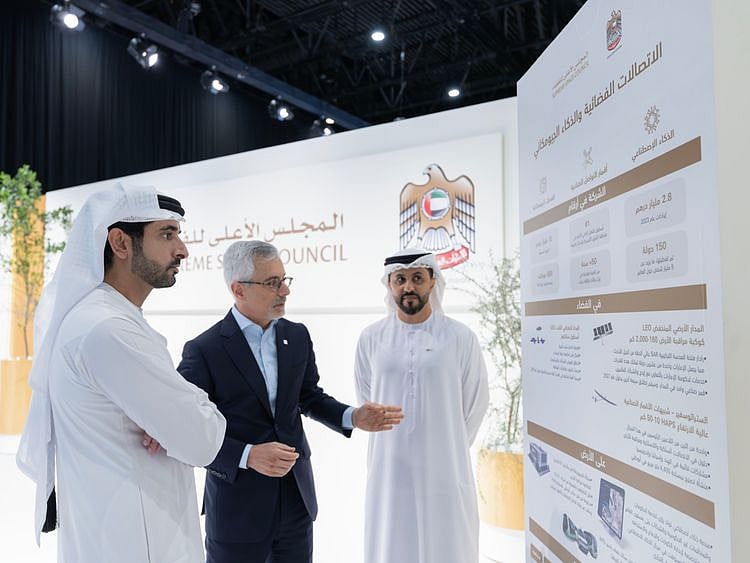UAE to launch new satellites as space sector grows
Sheikh Hamdan chairs Supreme Space Council’s first meeting, reviews plans and milestones

Dubai: UAE will launch two satellites in two months as the country’s space sector continues to grow.
The launches - set for December 2024 and January 2025 - were discussed at the first meeting of the Supreme Space Council on Monday, chaired by Sheikh Hamdan bin Mohammed bin Rashid Al Maktoum, Crown Prince of Dubai, Deputy Prime Minister and Minister of Defence of the UAE, and Chairman of the Supreme Space Council.
Sheikh Hamdan was briefed on upcoming space programmes set to launch in the next phase. These include the Thuraya 4 satellite, owned by Space42, scheduled for launch in December 2024, and the MBZ-SAT, currently under development by the Mohammed Bin Rashid Space Centre, which is slated for launch in January 2025.
Thuraya 4 will facilitate the development of next-generation satellite communications solutions for a diverse range of customers, including government, defence, enterprise and commercial sectors.
MBZ-SAT will meet the commercial demand for high-resolution satellite images that will show details within an area of less than one square meter.
Sheikh Hamdan said: “The national space sector continues to grow and advance, and we take immense pride in the remarkable achievements we have accomplished over the years. These milestones have become a cornerstone of innovation and scientific advancement in the UAE.”
Rise in spending and investment
He added: “The UAE space sector has undergone a remarkable transformation, achieving rapid growth within a record timeframe and setting a unique example of development and sustained success. The country’s investments in the sector reached Dh40 billion over the past years, with research and development spending on space exploration projects rising by 14.8% compared to the previous year. The sector has also recorded a 29% annual growth in the number of companies operating within it, while private sector financing and investments accounted for 44.3%, highlighting the growing contribution of private companies to this vital sector.”
Sheikh Hamdan continued: “Today, the UAE proudly leads five national projects aimed at exploring the moon, Mars, and the asteroid belt. We have developed a highly skilled workforce capable of undertaking the most challenging scientific missions. Our commitment to ambitious space exploration programmes remains steadfast. In the next phase, we aim to further strengthen the sector by fostering greater collaboration between the public and private sectors, driving innovation, and realising our aspirations for the future.”
The meeting was attended by Dr Sultan Al Jaber, Minister of Industry and Advanced Technology; Dr Ahmad Belhoul Al Falasi, Minister of Sports, Secretary-General of the Supreme Space Council, and Chairman of the Board of Directors of the UAE Space Agency; Abdullah bin Touq Al Marri, Minister of Economy; Omar bin Sultan Al Olama, Minister of State for Artificial Intelligence, Digital Economy and Remote Work Applications.
Also in attendance were Faisal Abdulaziz Mohammed Al Bannai, Advisor to the UAE President for Strategic Research and Advanced Technology Affairs; Talal Humaid Belhoul, Vice President of the Mohammed Bin Rashid Space Centre; and Dr Mubarak Saeed bin Ghafan Al Jabri, Assistant Undersecretary for Support and Defence Industries within the Ministry of Defence.
Dr Al Falasi said: “The dynamic growth of the space sector reflects the UAE’s unwavering commitment to nurturing Emirati talent and preparing them to lead the future of space exploration. The UAE is also focused on fostering an integrated ecosystem that enhances collaboration among all stakeholders. Additionally, we are working on developing a flexible and attractive regulatory environment to encourage local, regional, and global investments, thereby promoting innovation and strengthening the competitiveness of the national space sector.”
Role of private sector
The meeting also highlighted the pivotal role of the private sector in the development of the space industry, noting that its spending is almost equal to that of the public sector. This reflects the success of initiatives and projects implemented in previous phases to support and stimulate the economy, including the Space Economic Zones Program, which now includes over 200 private companies as members.
Furthermore, the meeting highlighted the UAE’s pioneering efforts in strengthening its international contributions to space exploration. The UAE became the first country globally to launch a project to explore the asteroid belt and the first in the region to embark on a mission to explore the moon and participate in the Artemis programme.
Sign up for the Daily Briefing
Get the latest news and updates straight to your inbox
Network Links
GN StoreDownload our app
© Al Nisr Publishing LLC 2026. All rights reserved.